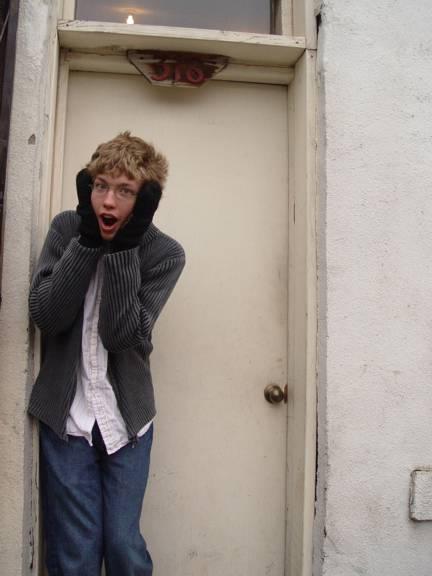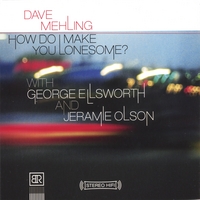Mix Tape: Happy Musician: Oxymoron?
Chris Godsey talks to Dave Mehling, who's just released a much-anticipated CD, "How Do I Make You Lonesome?" Perplexingly, Mehling is incredibly sane.





It was sad. So frustrating to see another promising young musician seek the sway of addictive chemicals. “I’m spending all my money on this stuff,” 20-year-old singer-songwriter Dave Mehling said recently during a chat at Duluth’s Chester Creek Cafe, his gold curls wild and sticking mostly straight out, like Bob Dylan’s Blonde on Blonde mop.
Mehling looks like an aspiring white-boy musician should: wiry and almost haggard; geeky and impossibly cool; utterly without traces of what must be significant and self-conscious affectation. He’d look perfect stumbling out of a tour van at some truck stop along I-90, or at a piano in an empty bar, running through late-afternoon sound check, when what he really wants is to take a nap or find somewhere to score.
“Espresso,” he said at the cafe before sipping from his second tiny cup of the hour. “I’m addicted. I spend at least six bucks on it every day. I’m at the point where I drink regular coffee when I’m thirsty.”
Tragic.
Right?
No? No.
OK. OK. You were misled with all that bullshit about addiction and self-destruction. Sorry.
But if you had hung out with Mehling for an hour or so, chatting about his new (first) record and his education and what he hopes to do with the rest of his life, you’d also have trouble coming up with a lead that said anything other than, “Dave Mehling’s preternaturally mature perspective on music, education, and life is impressive enough to be just this side of creepy. No one should be or even seem so together and destined for solid artistic and professional success. Damn him.”
Rock musician stories have to be about zany, self-destructive exploits, don’t they? How can an ostensibly non-tortured and conscientious kid have anything interesting to say? How can we trust or live vicariously through an artist who hasn’t bled himself for our pleasure?
West End, Represent
“I’m born and bred in Gary-New Duluth,” Mehling said. “I lived the whole West Duluth, Denfeld [High School] thing.”
His mom made him start piano lessons in fourth grade. (“I didn’t like them. I’m basically self-taught.”) He still plays, but says guitar, which he started on at 14 or 15, is probably his main instrument.
“I’m not better at guitar, but that’s what I write on,” he said. “When you’re holding a guitar next to you, whether it’s acoustic or electric, the wood vibrates and resonates and the sound comes right back at you, into your chest.”
Like most 20-year-old aspiring rock stars, he’s working on an organizational management degree, taking the occasional music theory class, and paying serious attention to how he handles the business side of music.
Yes, that was sarcasm.
In truth, not many 20-year-old aspiring rock stars are conscientious or wise enough to keep an organized list of media contacts, then, the week before their CD gets back from being duplicated, e-mail a writer and say something like, “Hey. We met briefly a few months ago. Could I send you a copy of my CD when it comes out? If you’ve got a chance to review it, or to mention the release concert at Beaner’s, that would be great. Thanks for your time.”
The CD arrived in the mail exactly when he said it would. That seems logical, but it’s impressive, especially for a guy who’s hopped up on espresso, carrying a full credit load, running through at least one solo set of tunes every day, playing in another band (The Brushstrokes), building a recording studio with buddies, trying to spend time with his sweetie, and spending at least two hours sending out CDs, booking summer tour dates, and managing a nascent career. His business education is obvious.
“It’s totally practical,” he says. “They don’t teach super specific things, but what you do learn is an extra level of organization and communication.”
His music theory courses are practical, too: “I want to understand how music works. If you have a song you’re working on and you get stuck, you can apply the things you learned about theory. It gives you directions. You don’t necessarily open the rule book and do what it says, but it’s all in the back of your head.”
The Music, Man
“My whole approach lately has been self-critical,” Mehling says. “Running a solo set every day and just listening to see where and how I can get better. Listening to recordings of myself and figuring out what I’m doing wrong. Trying to learn to be a real singer, and to be more natural.”
He’s been playing a 1970s Epiphone guitar “with a bit of reverb, a real clean sound. For a while I had terrible rhythm problems while learning guitar, but now I’ve got that down and I know the chords. I’ll never be a lead player, but I’ve been working toward doing what Jeff Buckley does on the Live at Sin-e disc. Becoming a good accompanying player, learning little tricks and inversions.”
If Mehling had to fit his music into a genre, he’d go with something like, “melodic pop or pop rock.”
Any definition can be reductive, and those two are, but they’re good places to start. Multiple listens to How Can I Make You Lonesome? turn up wisps or chunks of the Jayhawks, Ryan Adams, Bob Dylan, Elton John, Buckley, Billy Joel (even though an observation about his presence made Mehling cringe), Ben Folds, Beck, Bruce Springsteen, Fiona Apple, Nellie McKay, the Beatles, maybe some Rufus Wainwright, and hundreds of other artists who have been on the radio and in CD players since forever in the scheme of a 20-year life.
Mostly, though, an educated listener’s experience with Mehling’s music is one of, “Hey, this sounds like…hold on, it’s on the tip of my tongue…”; the history of singer-songwriter pop is there, as it should be in stuff put forth by a smart, inquisitive musician; but none of it is so imitative or painfully derivative that it fails to be his. It sounds familiar, but it’s unique.
He’s still testing his literal and figurative voices. Still figuring out who he is and how he should sound, and it’s obvious that he’s not going to be comfortable with any one genre’s stipulations or expectations.
Mehling acknowledges how his influences have been folded into his developing sound, and he says he’s changed even since recording How Do I Make You Lonesome? last October and November: “I’ve been listening to a lot of Feist, Damian Rice, TV on the Radio. Huge stuff. Records that once you listen to them, you don’t know why you need anything else. I really like almost any singer-songwriter from the early 1970s. Harry Nilsson, Randy Newman, Jackson Browne, Tom Waits. And [the Beach Boys’] Pet Sounds. I listen to that the most out of anything.
“I’ve been doing some writing on a Rhodes keyboard and listening to Motown. That bouncy stuff with some sleigh bells in the background. My voice has changed massive amounts since recording, and my songwriting has taken a turn. That record still represents me, and I’m glad to have it and to have spent the time doing it, but I’m already looking forward to my next project.”
That creative restlessness informs his live sets, too.
“My whole approach is to make it diverse. Maybe start off with an alt-country tune, then something with a cabaret feel, then back to something else. So often, I got to shows where there are three or four bands, and before long I get tired of the sound because it’s all so similar. I’m not a guy who runs around and lights his guitar on fire, so I have to help the audience stay engaged with a variety of songs.”
The Future
Mehling has two semesters left in his management program. He’s at UMD on a scholarship, and feels like he owes “it to everybody to finish.”
After that, he’d “like to try to make a living at music. I’d like to drive around Europe and the United States and play. If it doesn’t work out after a couple years of doing that, that’s fine. I just want those experiences. I have no obsession with fame or wealth, but I do want to soak up life for a while before settling into a career.
“Living in America, we can almost do whatever we want with the freedom and opportunities we’re given. I’m not nervous or apprehensive about the future. I’m more or less just excited.”